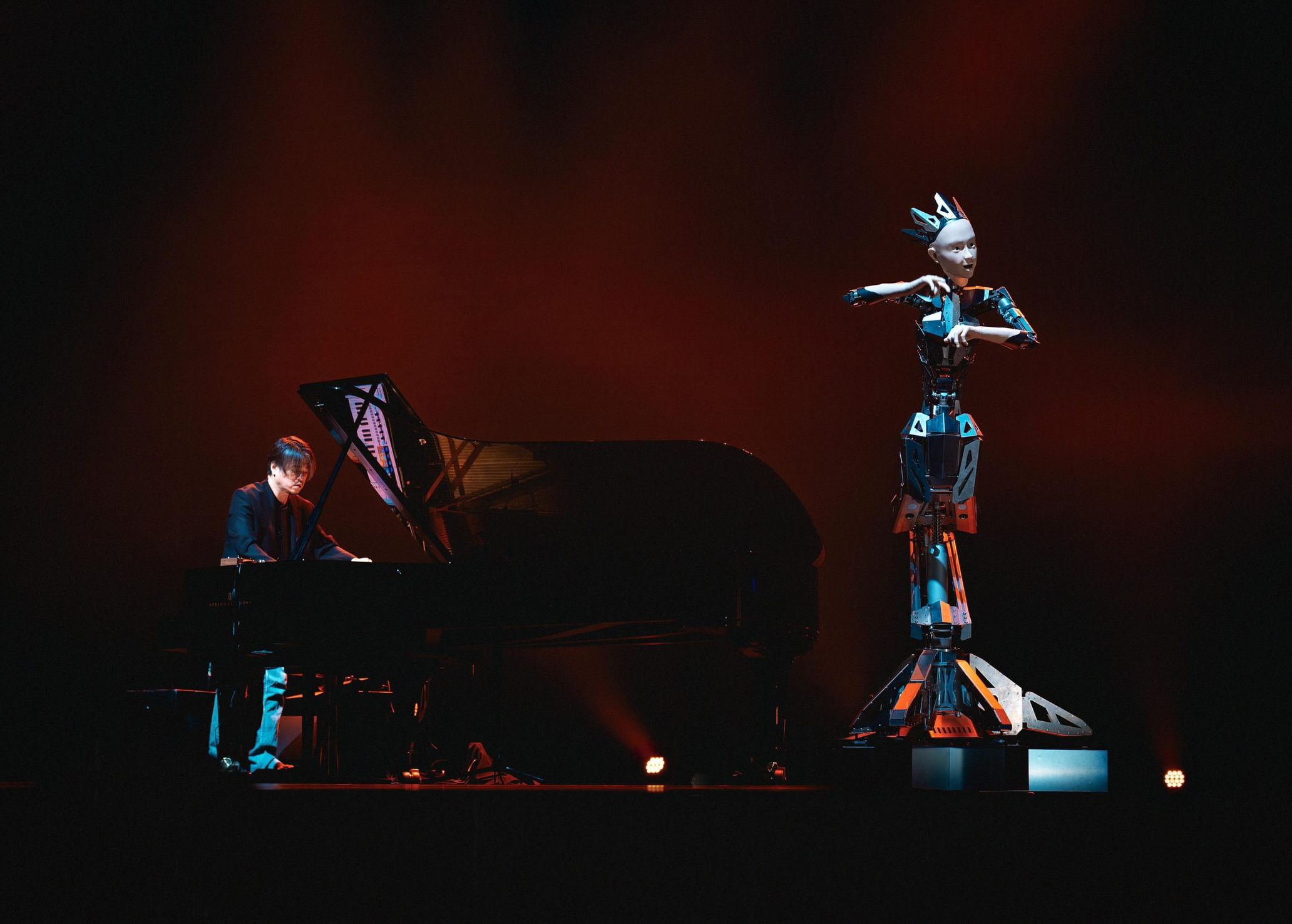
On November 18th, musician Keiichiro Shibuya performed Android Aria “Seeds of Prophecy,” his new piece using an android, piano, and electronic instruments, for the closing ceremony of the Lisbon Film Festival held in Portugal.
Lisbon Film Festival is an international film festival with film producer Paulo Branco, known for his work for esteemed Portuguese filmmakers like Manuel De Oliviera and Pedro Costa, as the director. The festival was held for the 17th time this year (2023 at the time of writing). Prominent names such as Francis F. Coppola, David Lynch, and Wim Wenders have previously participated in the festival. Aside from showing films this year, the festival presented a conversation with Pedro Costa and masterclasses by celebrated film directors like Leos Carax and Ryusuke Hamaguchi.
Artists from a plethora of fields outside of film joined as well. Laurie Anderson gave a lecture, world-renowned violinist Gidon Kremer played a concert, and so on. Keiichiro Shibuya’s Android Aria “Seeds of Prophecy” was chosen to close off the Lisbon Film Festival, filled with exciting programs.
The 50-minute piece comprised Shibuya playing the piano and an analog synthesizer/noise generator, using android Alter4’s singing as the centerpiece. Harnessing sounds and noises, he played his iconic songs, like “Scary Beauty” and “Midnight Swan,” as well as the eponymous track of the performance.
How did he take on the performance, and what did he aim to express? As he builds a steady career in film scoring, which films and soundtracks have shaped him? We set out to discover the answers in our interview.
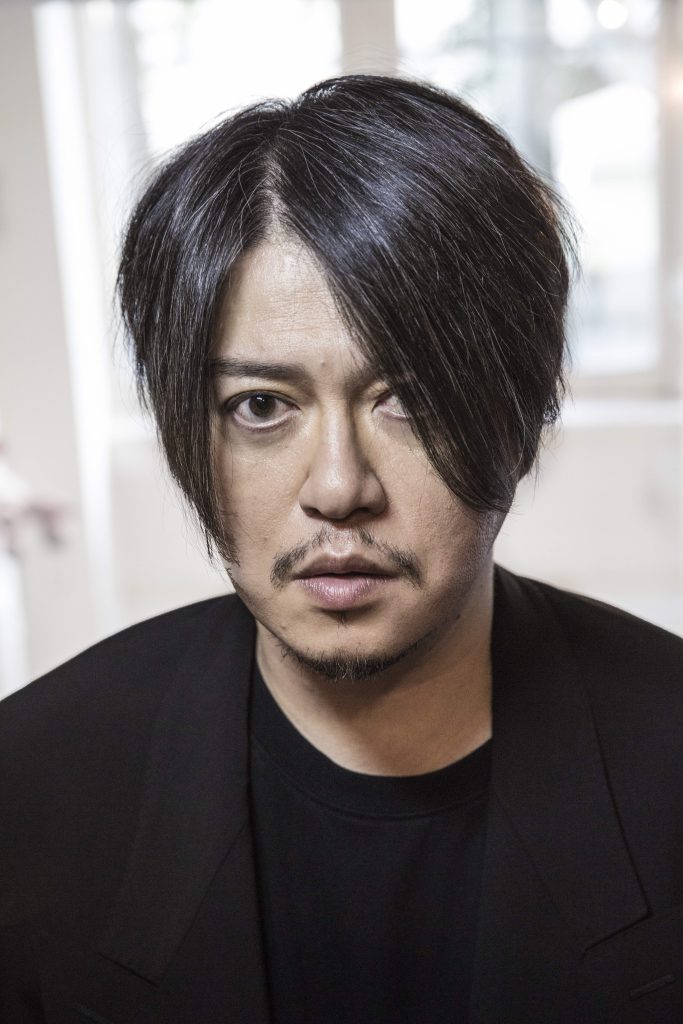
Keiichiro Shibuya
Keiichiro Shibuya graduated from the Tokyo University of the Arts with a B.A. in Music Composition. His work encompasses various mediums, from innovative electronic music to piano solos, operas, film scores, and sound installations. He’s based in Tokyo and Paris.
In 2012, Shibuya composed a Vocaloid opera with no human performers, The End, starring Hatsune Miku. The performance premiered at the Théâtre du Châtelet in Paris and has since toured around the globe. He collaborated with various artists and showed the opera at venues such as the Palais de Tokyo and Opéra national de Paris. In 2018, he composed the Android Opera®︎, Scary Beauty, which utilizes AI and stars a singing android that also conducts an orchestra. The opera has been shown in Japan, Europe, and the UAE. In August 2021, Shibuya’s opera, Super Angels, had its world premiere at the New National Theater Tokyo. In March 2022, he brought his new Android Opera®︎, MIRROR, a collaboration between an android, Buddhist music, shomyo, and an orchestra from the UAE, to Expo 2020 Dubai. In June of 2023, he showed the complete 70-minute version of the same opera at the Théâtre du Châtelet in Paris; it was a success and was met with a lot of attention from the local media. In October, Shibuya presented his new dialogic piece, IDEA, using two androids at the 21st Century Museum of Contemporary Art, Kanazawa.
Furthermore, he has also scored for many films. In September 2020, he created the soundtrack for Midnight Swan and won the 75th Music Award at the Mainichi Film Awards and the 30th Japan Movie Critics Award. In 2022, he composed the soundtrack for KAGUYA BY GUCCI, a short film, and appeared in it with an android.
ATAK:http://atak.jp
X:@keiichiroshibuy
Instagram:@keiichiroshibuy
Photography Claude Gassian
Creating a compelling performance and sound even in an era of high information density
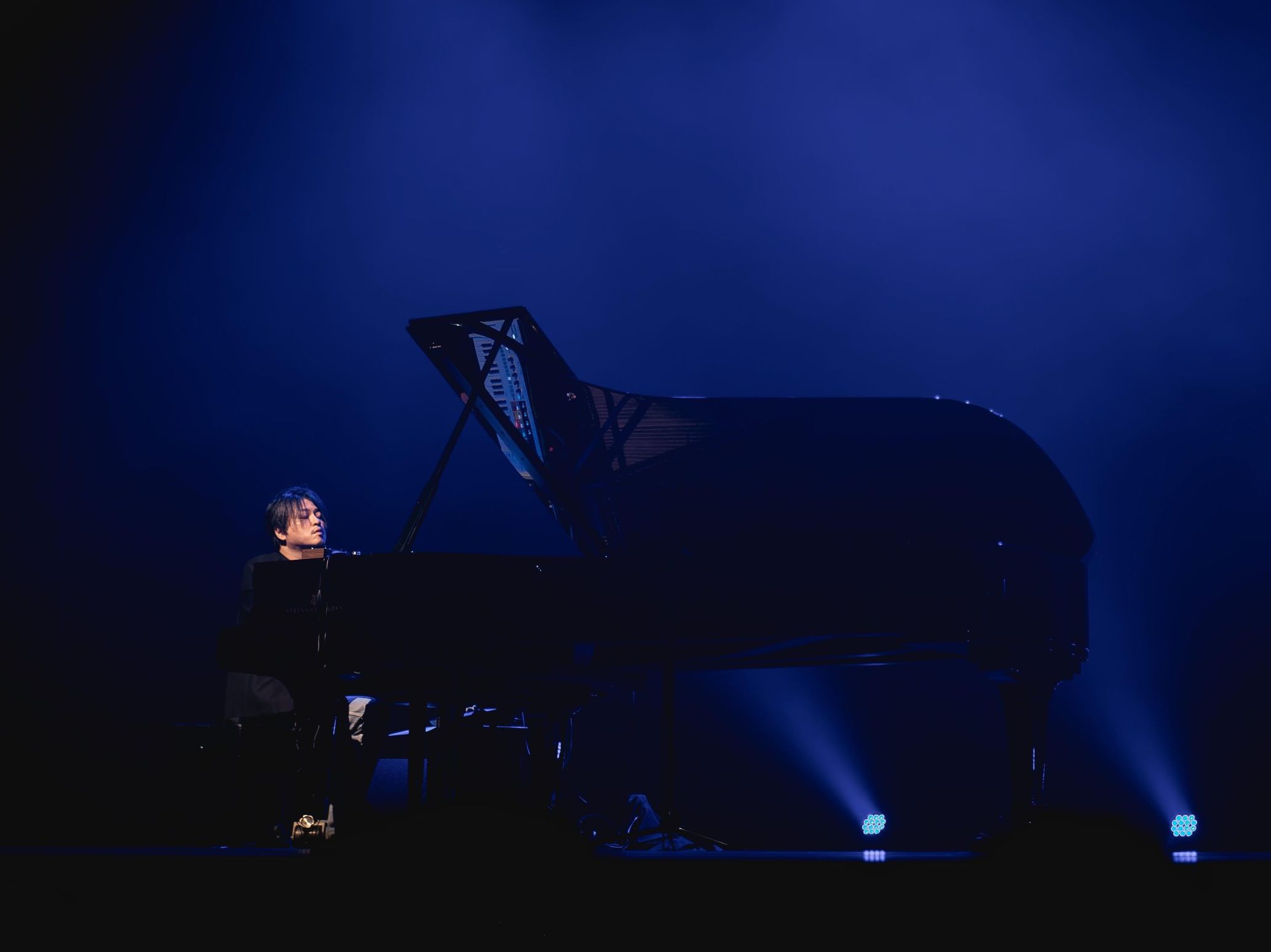
—How did your performance at the Lisbon Film Festival come about?
Around this spring, after the press release for my android opera MIRROR at the Théâtre du Châtelet was released (editor’s note: the performances were on June 21st, 22nd, and 23rd, 2023), they sent me an offer via email. One of the programs at the festival was called “Artificial Intelligence and Creation,” and they told me what I do would fit perfectly.
Lisbon Film Festival is an important festival where Paulo Branco, known for producing films like Ossos by Pedro Costa, is the director. I knew of it prior to this. We had a meeting over ZOOM, and they were highly intellectual people. Aside from film showings, the content was exciting; they also had Laurie Anderson’s talk and world-renowned violinist Gidon Kremer’s live performance on the lineup. That’s why I decided to accept the offer.
—I watched your performance via a video. It was a perfect performance, spanning around 50 minutes, including experimental sounds and noises, your well-known songs like “Scary Beauty” and “Midnight Swan,” and your new song, “Seeds of Prophecy.” What was the intention behind the structure of Android Aria “Seeds of Prophecy”?
When I first got approached, I initially thought I’d wait around 10 to 20 minutes because there’d be other performing artists since it was the closing event. But once I properly checked the information, I realized I would be the only performer and that there would also be an admission fee (laughs). That’s why I decided to build a live set that would stand on its own as a solo performance.
But considering the venue and whatnot, getting a local orchestra like I did for MIRROR in Paris would’ve been difficult. As a result of discussing whether there was another option numerous times, we landed on a set made up of just an android and me.
It’s becoming harder to have big shows like MIRROR, where there was an android, orchestra, and film crew, in Europe. Because of these circumstances, I had set out to create a compact performance with an android before this offer came. So, it was an excellent opportunity to do just that.
—It was a minimal set-up with just the android and you, but it was an extremely powerful performance.
I often think about what information density looks like in music. Just like the techno scene can only progress, information density in the world will only continue to increase. It won’t decrease. I try to create performances that are effective in such a society.
This applies not only to concepts and structures but to each tone of sound. In terms of the texture of electronic instruments, the amount of sonic information and depth are completely different when playing a recorded track on your computer versus playing a synthesizer or noise generator live.
Speaking from that perspective, how we understand the quality of sounds is changing drastically. During the 2000s and 2010s, sounds that had a lot of pressure, super low sounds, and sounds that made you physically shocked or stimulated your senses were dominant. I was also into that sound, but people quickly got used to it. Recently, I’ve been thinking about how low and high-frequency sounds need to be purer or have a fresh, pleasant feeling that could expand the senses. For instance, these noise generator-like synthesizers, Monos and Duos, from Hikari Instruments, which is a Japanese modular synthesizer manufacturer, that I’ve been using lately emit such sounds. They’re instruments that are like electronic circuits, so they’re pretty random. You can’t predict what kind of sounds will come out, so it’s fun to prioritize the purity of how they sound and play them live.
Behind “Prophecy”—hope for a world to come
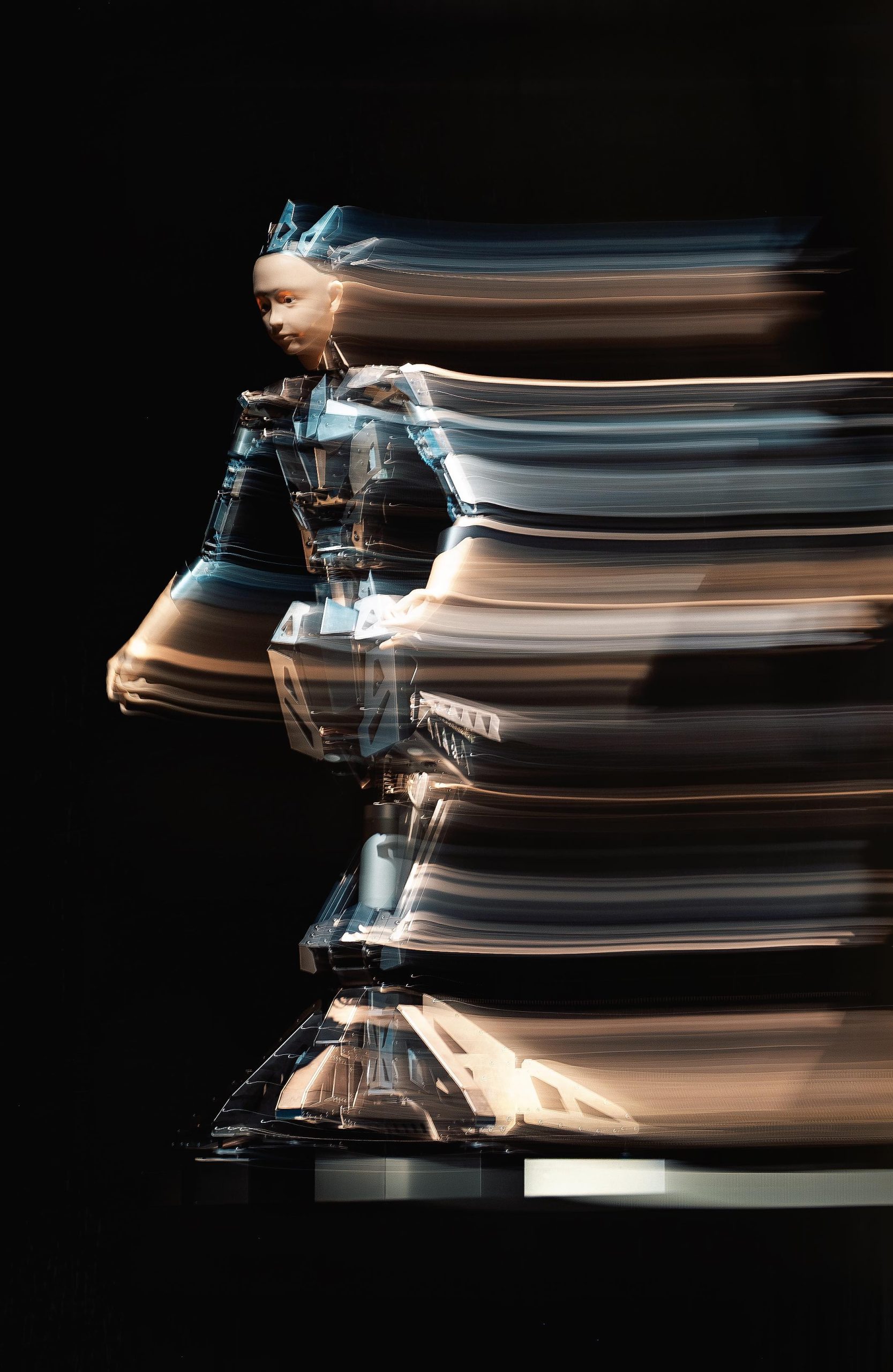
—Taking into consideration the state of the current world, your new song, “Seeds of Prophecy,” resonates in an evocative way, with Alter’s impressive singing, the title, and lyrics like “For a world where peace can truly be found” and “Seeds can thrive or perish / it’s your choice.” What was the intention behind the song?
Since I started performing with androids, I’ve been constantly thinking about what to make the android sing. Words are essential. For the songs in Scary Beauty, I used texts based on the posthumous works of Wittgenstein and Yukio Mishima and pieces of Michel Houellebecq’s and William S. Burroughs’ works for the lyrics. I wanted to create this contrast in which the android and AI sing about posthumous works and death, which don’t exist for them.
For my performance for PRADA MODE in May, I made the AI study the situation the android was going to be in that day, the fact that it was going to be an event organized by Prada, other performers, the location, Tokyo Metropolitan Teien Art Museum, and so on. I tried to make the android/AI generate its own thoughts about this information and sing about them. I felt like it was an interesting direction to take.
You know how I performed on Hodo Station after that in July?
—Alter, the android, referenced the government, expo, and media and sang lyrics like, “Why are there some news you can’t broadcast?” and “I will become the messenger of the truth.” The performance was met with a lot of responses on social media.
It was interesting to see people react like, “AI doesn’t try to read between the lines compared to humans; it’s honest.” In a way, they’re correct. In an artistic context, it was both performance art and a social experiment.
Going back to “Seeds of Prophecy,” if the schema for this performance was “an android that gives political messages,” it would’ve been too on-the-nose, so I went with the form of a prophecy. Like music, prophecies could affect someone somewhere, like a seed that flies far away and blooms into a flower. For such language, scattered like seeds, I made the AI study a vast amount of news on global turmoil and conflicts, like Russia and Gaza, then sing along to my synthesizer and piano.
I see the android/AI as a messenger, so calling it a prophet was valid. My favorite synthesizer is Prophet-5, so I always wanted to use the word “prophecy.”
Why Shibuya is drawn to Godard and Straub-Huillet
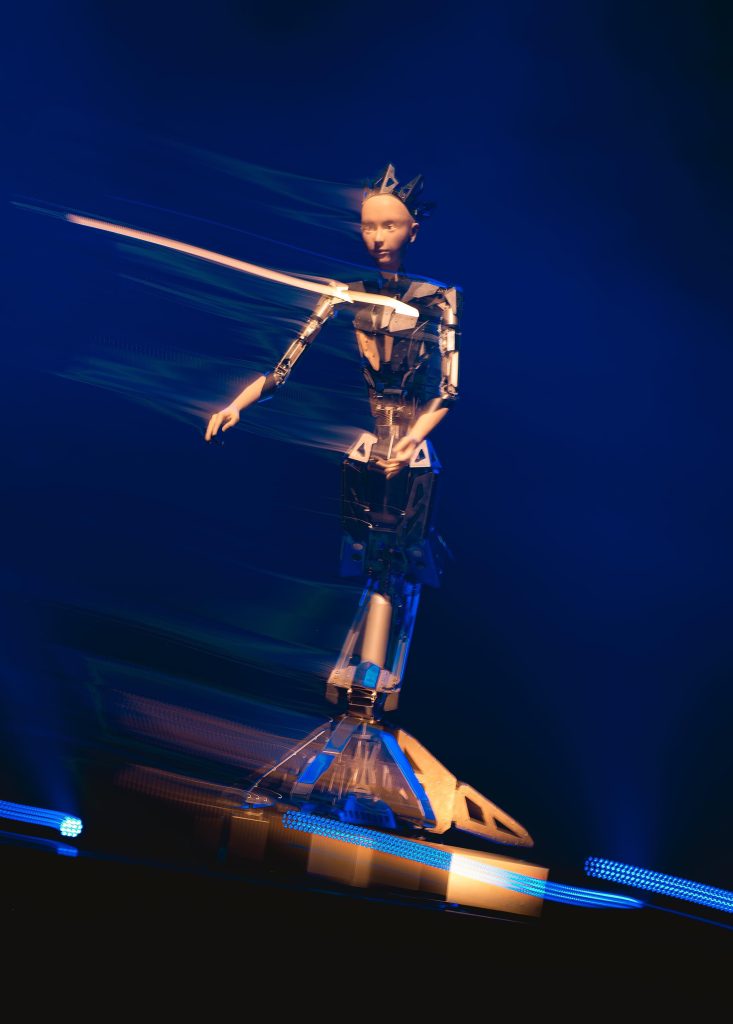
—I heard there was an installation based on Jean-Luc Godard’s The Image Book at the film festival.
Fabrice Aragno, the cinematographer for Godard’s later works, created an installation inside and outside this big building using footage and audio from The Image Book. I was introduced to him at a dinner for people involved in the festival, and I spoke to him about many things because I love The Image Book. Later, I looked at his installation while he explained it to me; it was a stunning and poetic installation where videos were projected on cloths, and fragments were played randomly on a monitor at the base of a tree in the garden.
—What makes Godard’s films appealing to you? As a musician, is there anything you feel from his work?
The way Godard uses music is crude, in a good way. For instance, he used many of ECM’s music because they supported him. But there’s this alienation effect-like thrill born from such groundlessness. In JLG/JLG – Self-Portrait in December (1995), he uses music by Hindemith and (Arvo) Pärt, who aren’t mainstream in Western music history, and then pops in a string quartet by Beethoven. That makes everything sound different.
Also, delays in Godard’s own narration embody this groundless crudeness. Yuji Takahashi-san and I were talking about computers and electronic music long ago. He said, “Rather than everything being complete inside the computer, things won’t be interesting unless there’s a human hand involved from outside the computer.” He said that’s what dub is. Godard’s delay in narration is directly connected to what Yuji-san said about dub.
—Aside from The Image Book and JLG/JLG – Self-Portrait in December, do you have other Godard films you like?
You can’t understand the meaning of Germany Year 90 Nine Zero at all if you just watch it because there are a lot of visual and literary references, but I love it because it’s like an overpowering hour-long video art. Regarding Our Music, when I saw the prior film, In Praise of Love, it didn’t hit the spot. I thought, “Godard’s grown old now,” but Our Music was like his comeback for me. It was great. I saw it in theaters around three times when it came out.
—Aside from Godard, which film directors did you watch when you were younger?
Straub-Huillet. Like Godard’s Germany Year 90 Nine Zero, I watched their films as though they were video art, not films. Today, I control stories in my android operas and performances and have developed an interest in things with narratives, but I wasn’t always this way. Straub-Huillet’s films had powerful visuals, of course, and their conceptual method of recording sound in one take using a monaural mic that came with the camera was exciting. I used to watch their films a lot.
—Did you watch any Japanese films?
I liked Kenji Mizoguchi when I was in high school, and so I used to watch his films. Of course, I watched Yasujiro Ozu’s works, too. I understood the significance of his works, but Mizoguchi’s films spoke to me so much more. I realized that maximalist things matched my sensibilities more than minimal things.
I also loved Takeshi Kitano’s films. And I also really liked Yoshimitsu Morita’s The Family Game. I love Straub-Huillet so much that I have many of their DVDs, but that was a longing for staticity. I am not a Straub-Huillet-like human being.
What lies at the core of a film composer
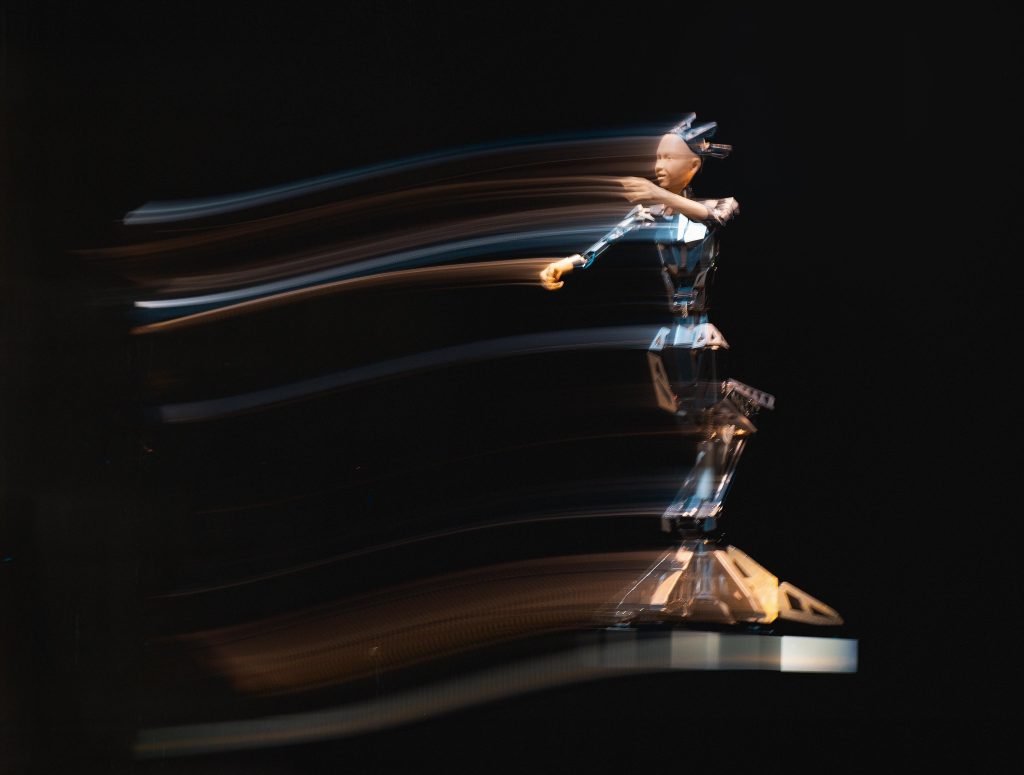
—Were there any soundtracks you listened to as a student?
I loved Ennio Morricone. This might come as a surprise, but I listened to the soundtrack to The Mission often. I, of course, listened to (Ryuichi) Sakamoto-san’s discography, too. No one in my generation was unaffected by him. I also remember frequently listening to Michael Nyman in university. I used to listen to him when I was young, but I started listening to Bernard Herrmann again recently. I look at his scores online, and it’s made me realize how great he was.
—Were you interested in making soundtracks then?
I thought, “I’m probably going to compose film scores one day” as a student. This is obvious, but you can’t score a film alone, as someone has to ask you to do it.
—The first film you made a soundtrack for is Yosuke Nakagawa’s Blue Fish, which came out in 1999. How did that come about?
There was a festival called Morphe that was held in Aoyama, and Yuji Takahashi-san and I were asked to have a one-night concert that was half-improvised and half-not in 1995, back when I was still a student. This person watched it and approached me. The main theme song I made then is “Blue fish,” which is on for maria.
—After that, you produced various soundtracks. At the closing ceremony of the Lisbon Film Festival, you performed “Midnight Swan,” which is the theme song for the film Midnight Swan. You won the Music Award at the Mainichi Film Awards and the Japan Movie Critics Award—a double win. As such, you’ve built quite a career as a film composer. What’s something you keep in mind when you make soundtracks? How does it differ from creating other types of music?
The less music a film has, the better. But in many cases, things don’t go that way. Often, the power of music is necessary in films. Of course, I try various things, like watching the film and exploring sounds on the spot or adding sounds here and there, but I always try to draw up a general plan. There’s this concept called leitmotif, which Wagner used in operas. For instance, let’s say there’s melody A for a male protagonist and melody B for his lover, a female protagonist; when the two meet, those two melodies come together to create a song. It’d be too conventional to do that with my own operas, but films are clearly temporal art, and many of them have stories, so the leitmotif technique is effective. In Midnight Swan’s case, there are respective themes for characters and situations, like the girl, rain, and dance. Those themes combine to create the main theme song, “Midnight Swan.”
—Your career and modes of expression are only further diversifying, as exemplified by your commercial music like “Midnight Swan,” large-scale android operas, and conceptual experimental works like IDEA at the 21st Century Museum of Contemporary Art, Kanazawa.
How do you balance them all?
The percentage changes depending on the year. Looking back, in chunks of years, I can see certain tendencies I made, like “I used electronic sounds a lot during this period” and “I made a lot of orchestras during this period.” I’ve recently been using orchestral and piano sounds, so I want to use more electronic sounds and synthesizers. Also, I increasingly want to do works that people can watch in the theater and profound, experimental works of self-pursuit. I have a sound installation project that I just started and a solo concert in Japan in the works; there’s a lot I’m thinking of doing, and I hope to show many of them next year.
—I’ll be looking forward to what you do in 2024. Thank you for your time today.
Translation Lena Grace Suda
